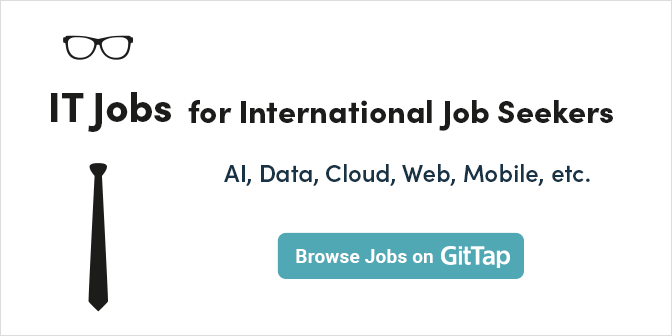Leveraging his specialty and strengths to find the perfect match【Series of Interviews with Successful GTalent Candidates】
At G Talent, our bilingual career advisors who are well versed in the IT industry will assist IT engineers from around the globe with their career change. We have many interesting stories to tell from our past candidates who were successful with their job hunting through our support and today we interviewed Mr. G.S to share his experience. Coming to Japan after building a career as an infrastructure engineer ―Could you briefly tell us about your background? After graduating from university, I worked for eight years at the same university as an infrastructure engineer. At the same time, I also worked as a freelancer for a biotech company in the Netherlands and took a part in a couple of start-ups in my local city. I was responsible for building pipelines and automating different parts of infrastructure, as well as operating and maintaining Linux servers as a Linux engineer.To be able to grow faster I wanted to work in a larger team and also wanted to try different areas, so I started working in a hosting company with a team of great SRE engineers. I worked there for a year before coming to Japan in May 2022. It was a meaningful time for me. I can definitely say that I learned a lot during that time. ―What made you decide to work in Japan in the first place? My wife is Japanese. We met in Russia and lived there for quite some time, but we wanted to try living in another country. New Zealand was initially on the top of our list of places to move to, but after some discussion, we decided to try moving to Japan, my wife’s home country. Reliable, considerate, and supportiveThat’s how my career consultant was like at G Talent ―Could you tell us why you chose G Talent?Actually, I was not actively looking for a job when we first came to Japan in May 2022 because I had a part-time job. But after living in Japan for a while, I decided to open my profile on LinkedIn. Various recruitment agencies immediately contacted me, including G Talent, which I already knew as a professional IT recruitment agency that helps foreign IT engineers find professional jobs in Japan. What was really appealing to me about G Talent was the professionalism of the career consultant who contacted me. As an IT-savvy bilingual career consultant, she paid close attention to my experience and desire to find a job that would allow me to make the most of my skills in Japan. This is the main reason I decided to register with G Talent. She answered my questions carefully, one by one, and was very considerate and supportive. Because of her, I was able to move forward with my job change with peace of mind. Thanks to all her efforts and support, I was able to find the perfect company for myself. Inspiring passionate team members and the company’s future vision ―What factors made you decide to join the current company?Out of four companies that I received offers from, I chose the one that is a leader in its area and has a team of very passionate engineers. I met with them in person and found them to be very friendly. I also thought the relaxed atmosphere in the office suited me.Another major factor was that the company’s technical direction matched the skill areas I wanted to enhance from then on. I signed on with them on September 1, 2022, thinking that the company would enable me to grow further as an engineer while learning new technologies.―Tell us about your current job and work environment.As a Linux Server Engineer, I am primarily responsible for the maintenance of Linux servers. If there are any additional management requests or user issues which need to be resolved, working closely with my team members, I also help in identifying potential issues.The current company introduces a hybrid work style that combines working from home with coming to the office. Currently, I work from home once a week and come to the office four days a week. But starting next year, I will be working from home three days a week and coming to the office only two days a week. The company’s official language is Japanese, including most of the documents. So, it is sometimes a little difficult for me because my Japanese is not very good yet. However, whenever I don’t understand something, people around me explain it in English. Thanks to their support, I have been able to proceed with my work smoothly. Before joining the company, I met with my current team and was told, “Language is not a problem. You can always communicate in English if you have difficulty with Japanese.”. Our team has non-Japanese members, including myself. We communicate with each other using whatever language (English or Japanese) is suitable at the time. We also have a lot of interaction within the team, such as going out to eat sushi together after work.In terms of living, Japan and Russia have many cultural differences, so I had to get used to that. It was fun to learn new things one at a time. It has been about eight months since we moved to Japan, and I have been enjoying a fulfilling life with a good work-life balance. Dedicated to further growth as an engineer ―Where do you see yourself in the future?I think there are two main career paths for IT engineers. One can either switch to management after gaining experience, or specialize in a particular field as an engineer. From now on, I aim to grow as an engineer by acquiring various new skills and knowledge, rather than driving the team as a project manager. Although I don’t have a specific goal, I want to develop my skills in automation, virtualization and cloud, and eventually become an engineer well-versed in those areas. The company provides us with access to an online learning platform where we can learn the skills we want to acquire through videos, and I plan to use it proactively.ーFinally, do you have a message for foreign IT engineers considering a career in Japan?Based on my experience, I can tell you that G Talent is one of the most reliable recruitment agencies for finding jobs in Japan’s IT industry. As I mentioned earlier, their career consultants carefully pay attention to your experience and desires, and evaluate the company culture, desired conditions, and other fine details to find the optimal match for you. You don’t have to be afraid if you’re not good at Japanese. There are more options to leverage your abilities than you can imagine. So, just follow your passion! After the interview What did you think? We hope that this article will be of help to those who are looking for a new career in Japan, and for those who are currently working in Japan, considering a career change.G Talent/GitTap supports global talents with their job search. Please click the banner below to learn more about our services. Please feel free to contact us as well.














